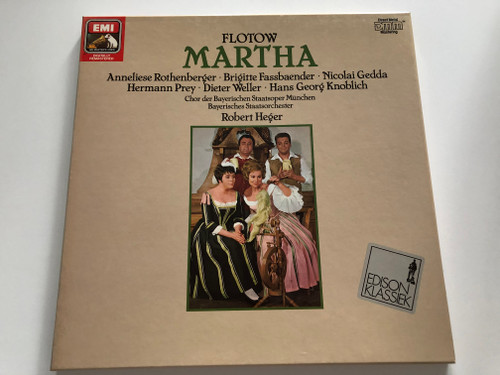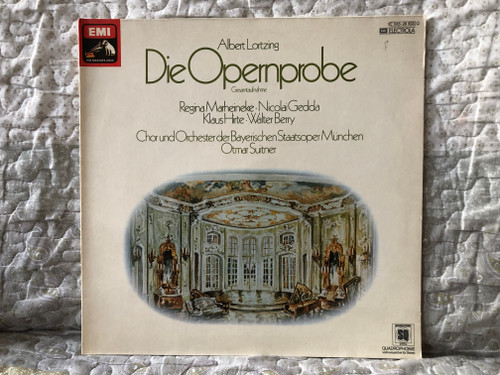Product Overview
Korngold: Die tote Stadt / Actors : Jonas Kaufmann, Marlis Petersen, Simon Stone, Bayerisches Staatsoper, Chor der Bayerischen / Bayerische Staatsoper Recordings / 2021 DVD
Total Playtime: 143 MInutes
Region 0 NTSC
Made in Germany
UPC 4028098000067
- MPAA rating : PG (Parental Guidance Suggested)
- Product Dimensions : 5.59 x 0.67 x 7.4 inches; 3.53 Ounces
- Director : Simon Stone
- Media Format : NTSC
- Run time : 2 hours and 23 minutes
- Release date : August 6, 2021
- Staatsoper
- Studio : Bayerische Staatsope
- Country of Origin : USA
- Number of discs : 2
Die tote Stadt (German for The Dead City), is an opera in three acts by Erich Wolfgang Korngold set to a libretto by Paul Schott, a collective pseudonym for the composer and his father, Julius Korngold. It is based on the 1892 novel Bruges-la-Morte by Georges Rodenbach.
The premiere of Erich Wolfgang Korngold’s Die tote Stadt at the Bayerische Staatsoper in autumn 2019 was praised both by press and audiences. Marlis Petersen (Marie / Marietta) and Jonas Kaufmann (Paul) sang the main roles, with the Bayerisches Staatsorchester under Kirill Petrenko’s baton, in the intense staging by Simon Stone. After the opening night, Joshua Barone wrote in the New York Times: “[The] work’s comeback may have reached its peak at the Bavarian State Opera. It’s difficult to imagine a better case for Die tote Stadt than was made in Munich.” The boundary between dream and reality increasingly dissolves as Paul, mourning his dead wife Marie, meets the dancer Marietta. With her looks so similar to Marie’s, Marietta becomes the object of the projection of Paul’s erotic desires. His grief has the traits of a ritual: The carefully composed strands of his dead wife’s hair are guarded like a relic. Following a nerve-racking “vision“ with cathartic effect, Paul is finally reeled back to reality. He can leave the Belgian city of Bruges as the place of his death cult. The original title of the piece, “Triumph des Lebens“ (Triumph of Life), is symbolic of the main character’s personal development.
ERICH WOLFGANG Korngold’s Tote Stadt was once one of the most popular operas in the world. So fierce was the competition in 1920 for the twenty-three-year-old former wunderkind’s third opera that it had its premiere simultaneously under Egon Pollak in Hamburg and under Otto Klemperer in Cologne. The 1924 Berlin premiere starred Lotte Lehmann and Richard Tauber, who went on to have a shellac hit with the duet, “Glück das mir verblieb.” Alas, when the Jewish Korngold’s music was banned by the Nazis, the opera was mostly forgotten until the late twentieth century. In recent years, it has reentered the repertoire, a remarkable comeback and a testament to the work’s compelling storyline and sumptuous score. This December 2019 Bayerische Staatsoper production under music director Kirill Petrenko was a hot ticket, with Jonas Kaufmann and Marlis Petersen making role debuts as the morbidly obsessive Paul and the flirtatious dancer Marietta. With fever dreams and murder on the menu, many were curious to see what Australian director Simon Stone—a noted hypernaturalist—would make of its fin-de-siècle excesses. The plot centers on Paul, a widower living in the ghostly city of Bruges and still mourning his wife, Marie, who died some years earlier. Surrounded by memorabilia, including a crucial braid of her hair in a glass case, he’s suddenly awakened to new life by a chance encounter with Marietta, a dancer at the opera who bears a striking resemblance to his dead wife. Most of Acts II and III comprise an overheated sexual fantasy in which Paul pursues Marietta, is repeatedly betrayed by her and finally strangles her with the fatal braid. Surprisingly, the opera ends hopefully, with Paul, come to his senses, potentially able to move on. Stone’s aim in choosing a contemporary setting is to exploit the inherent tension between the lush late-Romanticism in the music and the gritty reality of life today. In Paul, he correctly identifies a man struggling to come to terms with past trauma and present denial. Where he’s less successful is in capturing the music’s strong sense of place and its claustrophobic religiosity. Korngold’s trademark sound conjures ancient Bruges. His sinister, shifting harmonies suggest its crumbling masonry and gloomy canals. Designer Ralph Myers’s functional interiors suggest a man who has packed his former life away in boxes, including his dead wife’s wig, which was acquired, Stone proposes, as she was being treated for cancer. Revolving fragments of the set in Acts II and III help convey the sense of nightmare aptly enough, although the holy processions make little sense. With the “dead city” of the title missing, there’s some musical disconnect. Not so with the singers. Kaufmann is adept at conveying the character’s increasing bewilderment. He’s strong and tireless and offers plenty of vocal subtlety to relieve the role of its built-in relentlessness. Fearless in her physicality, and wholly convincing as a dancer, Petersen is an ideal Marietta. Her voice is breathtaking in its fluidity, and she’s peerless in her diction. She’s haunting, too, as the dead Marie, unnervingly bald and clad in a surgical gown. The rest of the cast is outstanding. Andrzej Filończyk displays a lovely, virile baritone, doubling as Paul’s friend Frank and Marietta’s would-be lover Fritz, and Jennifer Johnston’s earthy mezzo suits the loyal housekeeper Brigitta. The Staatsoper orchestra performs heroics in the pit; Petrenko shapes the music deftly while driving the drama forward with compelling energy. Skillfully directed for video by Myriam Hoyer, this is the Staatsoper’s first in-house DVD, and the production values are high, with opulent sound and a sharply defined image. Other recordings offer equally valid dramatic interpretations, but none are so compellingly sung and played. —Clive Paget, Opera News












